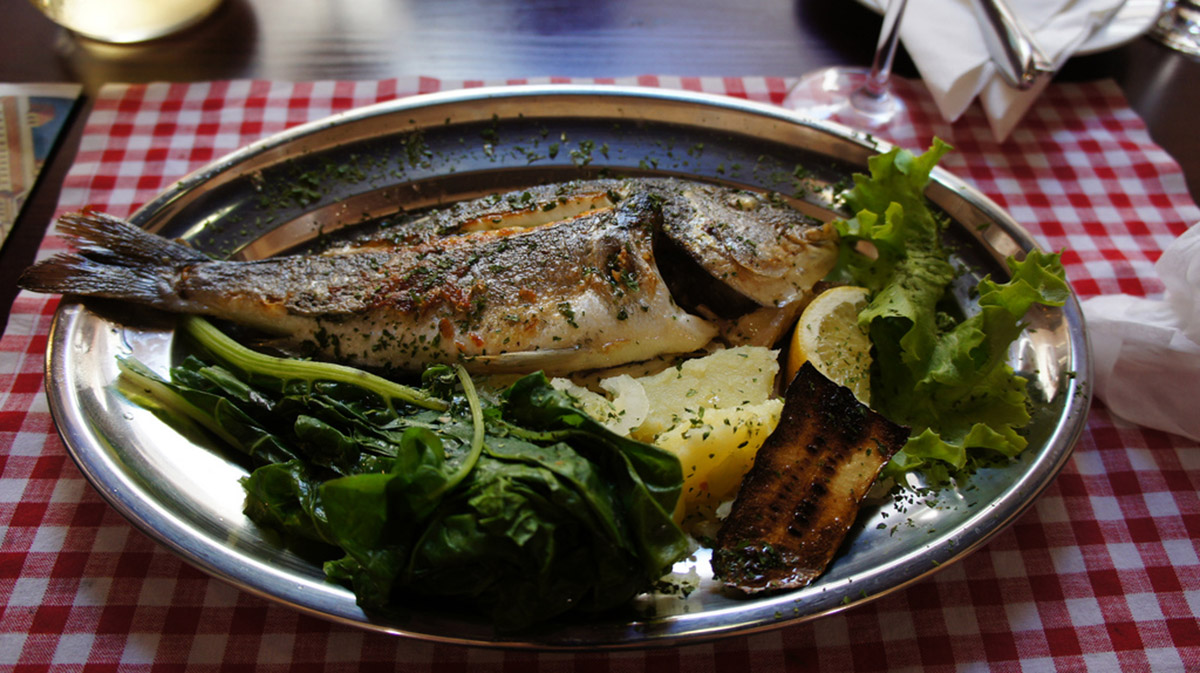Fish is a great source of animal protein. It’s versatile, fitting in with cuisine as far apart as Thai curries and traditional Scandinavian dishes, so whatever your tastes, fish can fit in. And fish can fit in with most diets, too. Obviously it’s out for vegetarians and vegans, but if you’re looking to reduce your red meat intake (you shouldn’t be, but still), you’re a piscitarian (vegetarian plus fish), if you’re eating Paleo or primal or any variant, fish fits in nicely. If you want to gain weight, fish will help. Dieting to lose weight? Fish fit in nicely there too. The unique nutrition profile of oily fish means they’re a great choice for young and old alike.

So why is fish disregarded?
In Britain, fish and chips is the traditional blue-collar takeaway countrywide, while poached kippers was a part of the breakfast spread of the well-to-do, and salmon on your table proved one of two things: you were either a sportsman with land to fish on, or a poacher. In Scandinavia, river fish competed with deepwater catches and shoreline fish for the national dinner table.
Additionally, there was the stimulus from Catholicism, which requires adherents to eat no meat on Fridays for religious reasons.
So what changed?
Obviously traditional religious observance has waned. But traditional food culture has waned too. People whose parents and grandparents grew up on pickled herring, wild salmon, mackerel, fried catfish, porgies, lutefisk and more are now all standing together – which is a good thing – in the queue for Olive Garden, which isn’t necessarily a good thing. Nowadays, people say fish is hard to cook, or it makes the whole house smell like fish, or people don’t know what fish to buy, or they had a bad experience with inexpertly-cooked fish early in life and it put them off forever.
But there are lots of excellent reasons to eat fish.
Fish is a great source of protein
Fish is an excellent source of protein. Unlike vegetable sources of protein, which are usually not very dense or very bioavailable or very complete, fish is all three. It’s just as proteinaceous as red meat, on average – and big sea fish like salmon and tuna are actually more protein-rich than beefsteak. It’s often significantly cheaper for equivalent quality, though.
See Also: Best Types Of Fish For Fast Muscle Gain
Even premium fish like bream are cheaper than most steak. If you’re buying salmon, it’s cheaper than salmon cut beef. And the highest-quality luxury fish you can get, like line-caught salmon fillets, is still less than half the price of filet steak.
And eating fish for its protein content means you also get a lot of other benefits along with it. For one thing, it’s often a great source of vitamins, like vitamins A and D, phosphorus, magnesium, selenium, and iodine, which is very important – it’s responsible for correct thyroid gland function.
Fish Is A Great Source Of Omega-3 Fatty Acids
The big selling point for oily fish like tuna, mackerel and salmon is their high omega-3 content. Omega-3 from fish oils is associated with a wide range of positive health outcomes.

That dates from studies done on Greenland’s native Inuit population over thirty years ago. At a time when the standard health advice was to eat lots of grains and go jogging, researchers were curious as to why a population that ate over 90% of its calories in the form of saturated animal fat had lower rates of heart disease than the general population in Denmark. Researchers found that Inuit who ate only one or two fish meals a week had a rate of heart attack that was up to 50% lower than those who didn’t eat fish. On this foundation has been laid three years f research into the effects of eating fish oils, showing that they have a protective effect on the heart now thought to be due to their ability to prevent oxidative damage to the lining of blood vessels.
Fish is convenient
Fish are an incredibly convenient food. Tinned tuna can simply be eaten right out of the can. If you prefer, it goes well cold with sweetcorn or mayonnaise. It’s easy to prepare, doesn’t need heating and it’s rich in protein and omega-3. Many other fish can be cooked easily and are also very versatile. You can poach, fry, bake or grill most fish in twenty minutes or less depending on the fish and portion size.
If you’re cooking for a family, fish can make a snap dinner delicious as well as simple. Something as easy as a baked potato, a tin of tuna miced half and half with sweetcorn, plenty of butter and a little salad is healthy enough for a pro athlete or bodybuilder, and filling enough for a teenage boy – or a man who’s skipped lunch! And it takes about 5 minutes.
Most fish can be bought as fillets or steaks, reducing the need to gut and clean the fish, which you’ll usually only need to do if you’ve caught them yourself.
But what about mercury?
Mercury is a heavy metal that’s found in industrial run-offs. Most animals can’t excrete mercury because their metabolisms can’t ‘get hold of it’ as a pure metal. It needs to be chelated – made into a non-toxic chemical compound that can safely be excreted. Humans can do this for ourselves, and the use of chelating agents like Calcium EDTA has been approved by the FDA. But animals can’t do it. So it ‘bioaccumulates’ – a predator eats two small fish, each of which has a small amount, and all the mercury that was in those fish ends up in the predator. That predator is eaten in turn – and finally all the mercury accumulates in apex or near-apex predators like big ocean fish like tuna, or like us.
See Also: 2 Healthiest Fish To Eat, And 2 Fish To Avoid
Mercury is a poison that damages the way your brain develops. If you’re pregnant, the FDA says you shouldn’t eat highest mercury fish at all, you should restrict your intake of high mercury fish to three six-ounce servings a month, and you shouldn’t eat more than 12 ounces of low-mercury fish a week. The fish you need to avoid are shark, king mackerel, swordfish and tilefish, together with marlin, orange roughy and bigeye tuna.
Fish can make a major contribution to a healthy diet, and learning to cook with fish isn’t complex. While you can get omega-3 fatty acids elsewhere fish is the best source. If you don’t already eat fish regularly, maybe now is the time to start!
If you do, and you have favourite recipes or tips to share, get in touch in the comments section!
- Photo courtesy of brownpau by Flickr: www.flickr.com/photos/brownpau/7176159319
- Photo courtesy of David Schiersner by Flickr: www.flickr.com/photos/freaky_designz/11634431364


Your thoughts on this